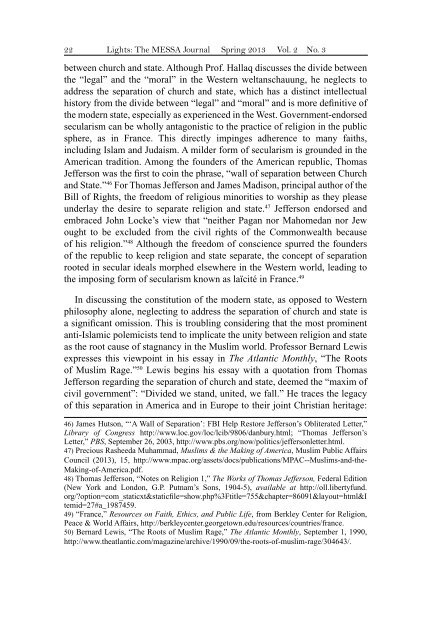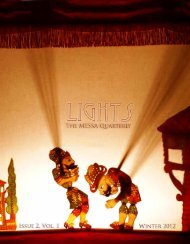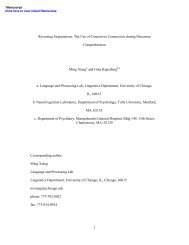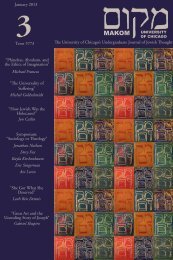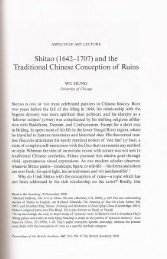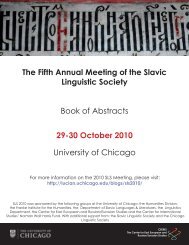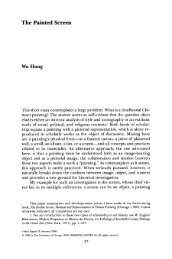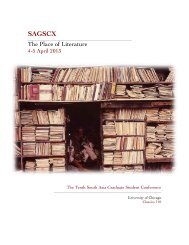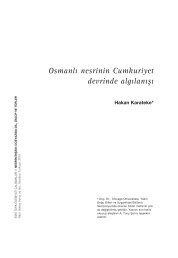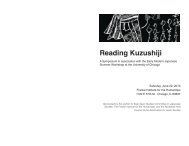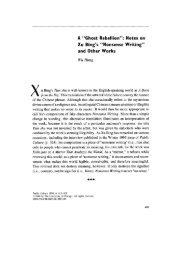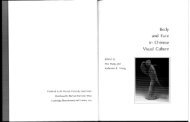You also want an ePaper? Increase the reach of your titles
YUMPU automatically turns print PDFs into web optimized ePapers that Google loves.
22 Lights: The MESSA Journal Spring 2013 Vol. 2 No. 3<br />
between church and state. Although Pr<strong>of</strong>. Hallaq discusses the divide between<br />
the “legal” and the “moral” in the Western weltanschauung, he neglects to<br />
address the separation <strong>of</strong> church and state, which has a distinct intellectual<br />
history from the divide between “legal” and “moral” and is more definitive <strong>of</strong><br />
the modern state, especially as experienced in the West. Government-endorsed<br />
secularism can be wholly antagonistic to the practice <strong>of</strong> religion in the public<br />
sphere, as in France. This directly impinges adherence to many faiths,<br />
including Islam and Judaism. A milder form <strong>of</strong> secularism is grounded in the<br />
American tradition. Among the founders <strong>of</strong> the American republic, Thomas<br />
Jefferson was the first to coin the phrase, “wall <strong>of</strong> separation between Church<br />
and State.” 46 For Thomas Jefferson and James Madison, principal author <strong>of</strong> the<br />
Bill <strong>of</strong> Rights, the freedom <strong>of</strong> religious minorities to worship as they please<br />
underlay the desire to separate religion and state. 47 Jefferson endorsed and<br />
embraced John Locke’s view that “neither Pagan nor Mahomedan nor Jew<br />
ought to be excluded from the civil rights <strong>of</strong> the Commonwealth because<br />
<strong>of</strong> his religion.” 48 Although the freedom <strong>of</strong> conscience spurred the founders<br />
<strong>of</strong> the republic to keep religion and state separate, the concept <strong>of</strong> separation<br />
rooted in secular ideals morphed elsewhere in the Western world, leading to<br />
the imposing form <strong>of</strong> secularism known as laïcité in France. 49<br />
In discussing the constitution <strong>of</strong> the modern state, as opposed to Western<br />
philosophy alone, neglecting to address the separation <strong>of</strong> church and state is<br />
a significant omission. This is troubling considering that the most prominent<br />
anti-Islamic polemicists tend to implicate the unity between religion and state<br />
as the root cause <strong>of</strong> stagnancy in the Muslim world. Pr<strong>of</strong>essor Bernard Lewis<br />
expresses this viewpoint in his essay in The Atlantic Monthly, “The Roots<br />
<strong>of</strong> Muslim Rage.” 50 Lewis begins his essay with a quotation from Thomas<br />
Jefferson regarding the separation <strong>of</strong> church and state, deemed the “maxim <strong>of</strong><br />
civil government”: “Divided we stand, united, we fall.” He traces the legacy<br />
<strong>of</strong> this separation in America and in Europe to their joint Christian heritage:<br />
46) James Hutson, “‘A Wall <strong>of</strong> Separation’: FBI Help Restore Jefferson’s Obliterated Letter,”<br />
Library <strong>of</strong> Congress http://www.loc.gov/loc/lcib/9806/danbury.html; “Thomas Jefferson’s<br />
Letter,” PBS, September 26, 2003, http://www.pbs.org/now/politics/jeffersonletter.html.<br />
47) Precious Rasheeda Muhammad, Muslims & the Making <strong>of</strong> America, Muslim Public Affairs<br />
Council (2013), 15, http://www.mpac.org/assets/docs/publications/MPAC--Muslims-and-the-<br />
Making-<strong>of</strong>-America.pdf.<br />
48) Thomas Jefferson, “Notes on Religion 1,” The Works <strong>of</strong> Thomas Jefferson, Federal Edition<br />
(New York and London, G.P. Putnam’s Sons, 1904-5), available at http://oll.libertyfund.<br />
org/?option=com_staticxt&staticfile=show.php%3Ftitle=755&chapter=86091&layout=html&I<br />
temid=27#a_1987459.<br />
49) “France,” Resources on Faith, Ethics, and Public Life, from Berkley Center for Religion,<br />
Peace & World Affairs, http://berkleycenter.georgetown.edu/resources/countries/france.<br />
50) Bernard Lewis, “The Roots <strong>of</strong> Muslim Rage,” The Atlantic Monthly, September 1, 1990,<br />
http://www.theatlantic.com/magazine/archive/1990/09/the-roots-<strong>of</strong>-muslim-rage/304643/.


